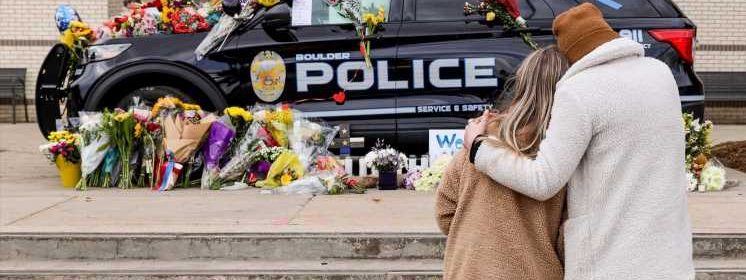Family said Colorado suspect had ‘mental illness.’ Experts say that’s rarely the cause of mass shootings.

After 10 people at a Colorado supermarket were gunned down this week, a question familiar in America’s cycle of bloodshed began to echo: Does mental illness drive mass shootings?
The 21-year-old suspect arrested in the rampage, the second in a week, was almost immediately described by family members as paranoid and antisocial.
But researchers and advocates say the rush to cast blame on a mental illness is misplaced.
“There’s no psychotic illness whose symptom is shooting other people,” said Dr. Jonathan Metzl, director of the Center for Medicine, Health and Society at Vanderbilt University.
“People are searching for explanations for behavior they don’t understand. It’s easy to put a label like mental illness on behavior that frankly seems just beyond the pale,” said Angela Kimball, national director for advocacy and public policy at the National Alliance on Mental Illness.
Less than a day after the shooting, family members of the suspected gunman told The Daily Beast they believed he had a mental illness.
“We didn’t know what was going on in his head,” Ali Aliwi Alissa, the suspect’s 34-year-old brother, told The Daily Beast. He also told the outlet his brother was paranoid and would say people were after him when he was a high school student.
“(It was) not at all a political statement; it’s mental illness,” he said.
Police have not yet said what the gunman’s motive was, but Metzl said immediate blame on mental illness does not tell the full story of what causes a mass shooting.
“There’s nothing sane about killing strangers, but I think the problem is it turns out to be a kind of deceptive narrative” to blame mental illness, Metzl said.
Why mental illness is immediately thought to be the cause
Many often jump to cast mental illness as the cause of a mass shooter’s action because people want a quick answer, Metzl said.
“Mass shootings are so traumatizing, and part of why they’re traumatizing is they rupture in a terrorizing way the safety of daily life. And we want there to be a coherent answer.
We want it to be one thing very often. It’s human nature,” Metzl said.
Mass shootings and mental illness’: Experts say the link is vastly overstated
But the true causes are more complicated and not fully understood, if ever, until long after the shooting fades from news coverage, Metzl said.
Paul Gionfriddo, president and CEO of Mental Health America, said the narrative around mental illness causing mass shootings has gotten worse over time and has prevented a more meaningful discussion, especially among policymakers, about how to address the actual causes.
Almost immediately after a shooter’s mental health is questioned, gun control is the next topic, Gionfriddo said. And that’s “not necessarily the answer” either.
“For people to use those weapons in that way, something else has to happen,” he said. “Plenty of people are walking around with serious mental illness never having had a single violent thought.”
‘Intermeshing’ factors linked to mass shootings
In June 2018, the FBI released a report studying mass shootings from 2000 and 2013 and their perpetrators’ behaviors before the attacks. The report found that in only a quarter of the cases could the agency verify that a mass shooter had been diagnosed with a mental illness. Only three had been diagnosed with a psychotic disorder, the report said.
The FBI report also identified multiple common stressors, or forces that put pressure on a person and may have caused distress, experienced by shooters. Though mental health was the most common stressor shared among shooters, multiple stressors are usually at play, the FBI report said.
“Mental illness alone is not a predictor of violence,” Kimball said. “If mental illness were a cause, we would be seeing proportionally so many more mass shootings.”
Metzl pointed to an “intermeshing” of factors, rather than one simple cause.
Things such as access to guns, family dynamics, past behavior, racism and misogyny are much more likely to be determinants of who commits a mass shooting, Metzl said. According to the FBI report, mass shooters on average displayed four to five concerning behaviors that others observed before the shooting. Among them are threats or confrontation, anger or physical aggression.
In many cases, shooters are young and male. “We don’t look to why that is or how that’s come about,” Gionfriddo said. “We don’t seem to want to ask those questions and how our policies decisions in this country may have moved us in a direction that has allowed things like that to continue or to fester.”
Source: Read Full Article
